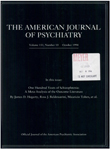Dissociation and posttraumatic stress disorder in Vietnam combat veterans
Abstract
OBJECTIVE: This study compared current dissociative symptoms and dissociation at the time of specific traumatic events in Vietnam combat veterans with posttraumatic stress disorder (PTSD) and Vietnam combat veterans without PTSD. METHOD: Vietnam combat veterans who sought treatment for PTSD (N = 53) were compared to Vietnam combat veterans without PTSD (N = 32) who sought treatment for medical problems. Dissociative symptoms were evaluated with the Dissociative Experiences Scale. Dissociation at the time of a combat-related traumatic event was evaluated retrospectively with the modified Dissociative Experiences Questionnaire. The Combat Exposure Scale was used to measure level of combat exposure. RESULTS: There was a significantly higher level of dissociative symptoms, as measured by the Dissociative Experiences Scale, in patients with PTSD (mean = 27.0, SD = 18.0) than in patients without PTSD (mean = 13.7, SD = 16.0). This difference persisted when the difference in level of combat exposure was controlled with analysis of covariance. PTSD patients also reported more dissociative symptoms at the time of combat trauma, as measured retrospectively by the Dissociative Experiences Questionnaire (mean = 11.5, SD = 1.6) than non- PTSD patients (mean = 1.8, SD = 2.1). CONCLUSIONS: Dissociative symptoms are an important element of the long-term psychopathological response to trauma.
Access content
To read the fulltext, please use one of the options below to sign in or purchase access.- Personal login
- Institutional Login
- Sign in via OpenAthens
- Register for access
-
Please login/register if you wish to pair your device and check access availability.
Not a subscriber?
PsychiatryOnline subscription options offer access to the DSM-5 library, books, journals, CME, and patient resources. This all-in-one virtual library provides psychiatrists and mental health professionals with key resources for diagnosis, treatment, research, and professional development.
Need more help? PsychiatryOnline Customer Service may be reached by emailing [email protected] or by calling 800-368-5777 (in the U.S.) or 703-907-7322 (outside the U.S.).



